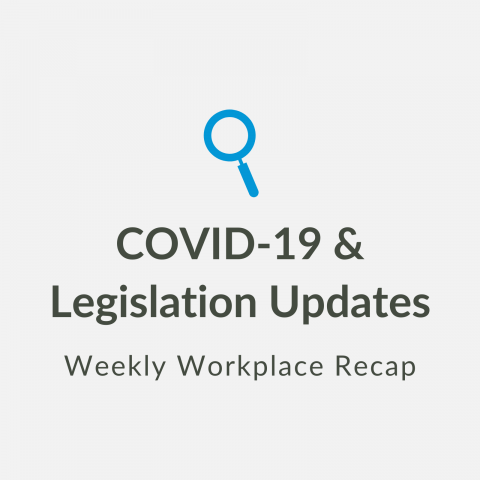COVID-19 & Legislation Updates | Weekly Workplace Recap from July 30 to August 5 2021

Below are the key announcements from the Federal, Alberta and BC governments that touch on workplace legislation from July 30 to August 5, 2021.
Federal
Extends the CEWS, CERS, Lockdown Support and more COVID-19 Benefits
The federal government is updating the following COVID-19 benefits and business supports by:
-
Extending the eligibility period for the Canada Emergency Wage Subsidy, the Canada Emergency Rent Subsidy and Lockdown Support until October 23, 2021, and increasing the rate of support employers and organizations can receive during the period between August 29 and September 25, 2021.
-
Extending the Canada Recovery Benefit (CRB), the Canada Recovery Caregiving Benefit and the Canada Recovery Sickness Benefit until October 23, 2021.
-
Increasing the maximum number of weeks available for the CRB, by an additional four weeks, to a total of 54 weeks, at a rate of $300 per week, and ensuring it is available to those who have exhausted their employment insurance (EI) benefits.
For more information, check out this news release and backgrounder.
Revises Pay Equity Act for Federally Regulated Employers
The Pay Equity Act (Act), introduced as part of the Budget Implementation Act, 2018, No. 2. (Bill C-86), will come into force as of August 31, 2021. The Act aims to eliminate the gender wage gap and re-affirm Canada’s commitment to ensuring “equal pay for work of equal value.”
As of August 31, federally regulated employers with 10 or more employees will have three years to establish and implement a proactive pay equity plan in accordance with the requirements of the Act.
In developing their pay equity plans, federal employers will be required to:
-
Identify job classes within their workplace.
-
Determine the gender predominance of the identified job classes.
-
Determine the value of work performed by each job class.
-
Identify the level of compensation associated with each job class.
-
Compare compensation associated with predominantly female job classes with the compensation associated with predominantly male job classes of similar value.
-
Identify predominantly female job classes that require an increase in compensation and set out a date on which the increase in compensation is payable.
For more information, check out this article.
Alberta
Updates COVID-19 Workplace Guidance Documents
Alberta entered Stage 3 of the Open for Summer Plan on July 1. All public health measures have been lifted, except for isolation/quarantine requirements and some restrictions in health care settings and public transit.
Businesses are still required to continue to assess the risk of all biological hazards and control the identified risks based on occupational health and safety (OH&S) requirements.
Alberta Biz Connect provides the following resources:
- Hazard assessment and control
- Occupational health and safety: starter kit
- Health Canada approved hard-surface disinfectants and hand sanitizers for use against COVID-19 (search products by DIN number)
- personal protective equipment (PPE)
For more information, check out more of Alberta's Guidance Documents.
British Columbia
Releases Order on Mandatory Face Coverings for Employers in Central Okanagan
The Order on Mandatory Face Coverings - Central Okanagan has been released after a COVID-19 outbreak has been declared in the Central Okanagan.
Employers in the Central Okanagan are required to follow a mandatory mask order for people 12 and older in all public indoor spaces in the communities of Peachland, West Kelowna, Westbank First Nation, Kelowna, and Lake Country.
Employers are also required to monitor for communicable disease related information from their regional public health officials and the provincial health officer related to their area and industry, and to follow that guidance and direction should additional measures be necessary in their workplace.
Learn more about responding to elevated risk and additional measures employers may need to follow in these instances.


